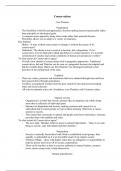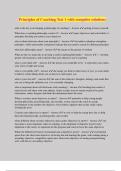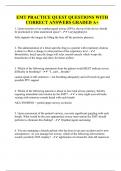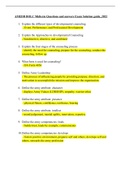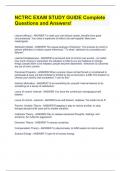Conservatism
Core Themes
Pragmatism
- The flexibility in beliefs and approaches, decision making based on practicality rather
than principles or ideological goals
- A common-sense approach, doing what works rather than untested theories.
Flexibility allows you to adapt to a variety of situations.
Key thinkers
- Burke; “A state without some means of change is without the means of its
conservation”
- Oakeshott; “My theme is not a creed or a doctrine, but a disposition. To be
conservative is to be disposed to think and behave in certain manners; it is to prefer
certain kind of conduct and certain conditions of human circumstances to others”
To what extent do Conservatives agree?
- Overall, most strands of conservatism stick to pragmatic approaches. Traditional
conservatives did and Thatcher can be seen as a pragmatist because she adapted and
did the sensible thing. Others say that Thatcher was ideological and had a clear
direction in her rolling back of the state.
Tradition
- These are values, practices and institutions that have endured through time and have
been passed down through generations.
- It reflects accumulated wisdom from the past, tested by time and good at keeping
order and social cohesion.
- All want to maintain some sort of tradition, even Thatcher with Victorian values
Organic society
- Organicism is a belief that society operates like an organism, the whole being
more than a collection of individual parts.
- Humans are dependent and security seeking creatures and cannot live as
individuals but in social groups as it gives them meaning. Otherwise it causes
anomie in society.
- This means that a hierarchy is natural and people must know their place, structure
provides them with stability and order.
To what extent do Conservatives agree?
- The new right, Thatcher, believes more in rational individuals – “there is no such
thing as society, only individuals and their families.”
Paternalism
- Society is naturally hierarchical with fixed or established social groups, thus
equality is undesirable as it is an inevitable result of an organic society.
- Noblesse Oblige – those with higher status have an obligation or responsibility to
help the poorer and worse off in society, paternalistic.
- Those at the top have a duty to exercise authority as natural leaders, assumes
lower classes cannot rule or help themselves.
Human imperfection
, - Humans are psychologically, morally and intellectually imperfect meaning they
are limited and dependent on a set structure.
- Humans are immoral and therefore need a strong authoritarian state to keep order.
As intellectually limited people they cannot understand the political world and
thus should stick to tradition.
Key Thinkers
- Hobbes; “Power after power” – moral imperfection
- Oakeshott; the political world is “boundless and bottomless”
Strands of conservatism
Traditional
- Burke opposed the events of the French revolution and the disorder that followed,
thus traditional conservatism is a defence of the established order
- Committed to hierarchic and paternalistic values. They support the idea of an
organic society because in order for society to function effectively there must be
some form of hierarchy as individuals in society need to be aware of their place
and accept their duties.
- Those with the highest status have a duty to look after those lower down, noblesse
oblige. Saw the aristocracy as the natural leaders of society.
- Reform should be pragmatic rather than ideological to prevent such chaos as there
was after the revolution.
One Nation
- Associated with Benjamin Disraeli who was concerned about the effects of
industrialisation and laissez faire capitalism. He saw the risk of the UK becoming
divided into ‘two nations’ – the rich and poor.
- Unrestrained capitalism led to selfish individualism that weakened the sense of
responsibility people have and conservatism should renew its paternalistic focus.
It also prevents revolution by caring for those least well off.
- “Change to conserve”
- Seen in the party’s acceptance of welfarism and Keynesian economics. Macmillan
developed these ideas in the ‘middle way’ that was later side-lined by Thatcher.
New Right – Neoconservatism and Neoliberalism
- This emerged as a rival tradition to one-nation conservatism. In the 70s countries
were suffering from ‘stag-flation’ and many conservatives saw this as a result of
liberal individualism going too far.
- Combination of traditional conservative ideas and classical liberal economics.
Neoliberalism
- Built upon free market ideas of Adam Smith, arguing the state should be
minimalised and the market left alone. economic problems are a result of market
intervention that causes inefficiency. Dead hand of govt – Hayek
Neoconservatism
- Fear of social fragmentation, tough on law and order and public morality. More
authoritarian than neoliberals.
- The state is important in strengthening leadership, authority and moral thinking.
Individual values will weaken society.
Core Themes
Pragmatism
- The flexibility in beliefs and approaches, decision making based on practicality rather
than principles or ideological goals
- A common-sense approach, doing what works rather than untested theories.
Flexibility allows you to adapt to a variety of situations.
Key thinkers
- Burke; “A state without some means of change is without the means of its
conservation”
- Oakeshott; “My theme is not a creed or a doctrine, but a disposition. To be
conservative is to be disposed to think and behave in certain manners; it is to prefer
certain kind of conduct and certain conditions of human circumstances to others”
To what extent do Conservatives agree?
- Overall, most strands of conservatism stick to pragmatic approaches. Traditional
conservatives did and Thatcher can be seen as a pragmatist because she adapted and
did the sensible thing. Others say that Thatcher was ideological and had a clear
direction in her rolling back of the state.
Tradition
- These are values, practices and institutions that have endured through time and have
been passed down through generations.
- It reflects accumulated wisdom from the past, tested by time and good at keeping
order and social cohesion.
- All want to maintain some sort of tradition, even Thatcher with Victorian values
Organic society
- Organicism is a belief that society operates like an organism, the whole being
more than a collection of individual parts.
- Humans are dependent and security seeking creatures and cannot live as
individuals but in social groups as it gives them meaning. Otherwise it causes
anomie in society.
- This means that a hierarchy is natural and people must know their place, structure
provides them with stability and order.
To what extent do Conservatives agree?
- The new right, Thatcher, believes more in rational individuals – “there is no such
thing as society, only individuals and their families.”
Paternalism
- Society is naturally hierarchical with fixed or established social groups, thus
equality is undesirable as it is an inevitable result of an organic society.
- Noblesse Oblige – those with higher status have an obligation or responsibility to
help the poorer and worse off in society, paternalistic.
- Those at the top have a duty to exercise authority as natural leaders, assumes
lower classes cannot rule or help themselves.
Human imperfection
, - Humans are psychologically, morally and intellectually imperfect meaning they
are limited and dependent on a set structure.
- Humans are immoral and therefore need a strong authoritarian state to keep order.
As intellectually limited people they cannot understand the political world and
thus should stick to tradition.
Key Thinkers
- Hobbes; “Power after power” – moral imperfection
- Oakeshott; the political world is “boundless and bottomless”
Strands of conservatism
Traditional
- Burke opposed the events of the French revolution and the disorder that followed,
thus traditional conservatism is a defence of the established order
- Committed to hierarchic and paternalistic values. They support the idea of an
organic society because in order for society to function effectively there must be
some form of hierarchy as individuals in society need to be aware of their place
and accept their duties.
- Those with the highest status have a duty to look after those lower down, noblesse
oblige. Saw the aristocracy as the natural leaders of society.
- Reform should be pragmatic rather than ideological to prevent such chaos as there
was after the revolution.
One Nation
- Associated with Benjamin Disraeli who was concerned about the effects of
industrialisation and laissez faire capitalism. He saw the risk of the UK becoming
divided into ‘two nations’ – the rich and poor.
- Unrestrained capitalism led to selfish individualism that weakened the sense of
responsibility people have and conservatism should renew its paternalistic focus.
It also prevents revolution by caring for those least well off.
- “Change to conserve”
- Seen in the party’s acceptance of welfarism and Keynesian economics. Macmillan
developed these ideas in the ‘middle way’ that was later side-lined by Thatcher.
New Right – Neoconservatism and Neoliberalism
- This emerged as a rival tradition to one-nation conservatism. In the 70s countries
were suffering from ‘stag-flation’ and many conservatives saw this as a result of
liberal individualism going too far.
- Combination of traditional conservative ideas and classical liberal economics.
Neoliberalism
- Built upon free market ideas of Adam Smith, arguing the state should be
minimalised and the market left alone. economic problems are a result of market
intervention that causes inefficiency. Dead hand of govt – Hayek
Neoconservatism
- Fear of social fragmentation, tough on law and order and public morality. More
authoritarian than neoliberals.
- The state is important in strengthening leadership, authority and moral thinking.
Individual values will weaken society.

